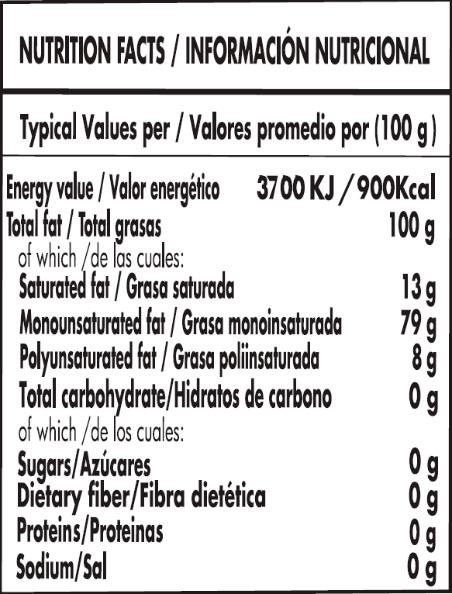Extra virgin olive oil nutritional information
Olive oil contains important nutrients for people’s diets. It is very important to know its nutritional value in order to know what we are ingesting and also the percentages that correspond to each nutrient.
Every bottle of olive oil, whatever its variety and whatever its quality, must have nutritional information. This is presented in the form of a table and is regulated by the corresponding bodies.
In this post, we are going to describe the nutritional information of olive oil, if you want to know what your favorite oil contains, read on:

Extra virgin olive oil nutrients
Olive oil has many important nutrients, some present to a lesser extent and others to a greater extent. If we analyze the quantities of nutrients in olive oil, we can see that the most important nutrients are fatty acids.
Olive oil is characterized by a high percentage of monounsaturated fatty acids. This is a hallmark of this product and the reason why many people prefer it in their diet.
EVOO has components present to a lesser degree. These components are polyphenols, carotenes, chlorophyll, tocopherols, etc… Each of them contributes to the product, e.g. color, flavor, vitamin A and E, etc.
What nutrients does olive oil contain
The nutrient table of a product is the information expressed in a particular way, and following formal standards, of what the product contains. This is required so that consumers know what they are ingesting and also know the nutritional value of the food.
In the case of olive oil, the manufacturer must include on the label information about the amount of calories the oil contributes to the diet, as well as the percentages of the different types of fat it contains. Furthermore, it must contain information on the amount of carbohydrates, protein, dietary fibre, salt and sugar.
Calories extra virgin olive oil
Olive oil is a high-calorie food, it contributes a lot of calories to the diet, 900 Kcal are contained in 100 grams of olive oil. This is because it is a substance composed entirely of vegetable fat. Lipids are a macro food that contributes many calories per gram, making it stand out as a nutrient for this reason.
Extra virgin olive oil is a very natural product, derived from the process that is given to the olive to obtain the oil, without any other type of additive. By consuming extra virgin olive oil, you are acquiring nutrients composed of fats of different types that provide significant amounts of calories.
Calories in 1 tablespoon extra virgin olive oil
The calorie content of olive oil is high, but we are unlikely to consume large quantities of this product.
Most of the time we dress our food with a spoonful of olive oil, which represents 20 grams. This amount is enough to give flavor to food and to enjoy a high-quality product such as EVOO.
In 20 grams of olive oil, i.e. one spoonful, there are 180 Kcal, which is an acceptable figure for any meal.
Extra virgin olive oil fat content
Olive oil is 98% fat. As we said before, it is a pure product, which means that almost all of its composition is made up of lipids.
Does extra virgin olive oil have saturated fat?
Saturated fat is present in olive oil between 12% and 15% approx., i.e. in 100 grams of oil there are between 12 and 15 grams of saturated fat. This represents a low percentage of saturated fat. In other oils, such as sunflower, canola or soybean oil, the percentage of saturated fat is higher.
It should be noted that not all fats are the same, each type of fat has its own characteristics, in the case of saturated fats, a low percentage is considered a good attribute in an oil.
Monounsaturated fat from olive oil
It is the most important fat contained in olive oil (oleic acid), both in terms of quantity and benefits, accounting for between 60% and 83% of all the fats it contains.
Polyunsaturated fat from olive oil
It is the smallest of the fats contained in olive oil. Normally in percentages between 5% and 10% of the total fats. It is considered a “good fat” in the same way as monounsaturated fats.
Does olive oil have carbohydrates?
Carbohydrates, or carbohydrates, are not present in olive oil. In other words, the carbohydrate content of olive oil in the diet is zero.
Because olive oil is 98% fat, there is not a gram of carbohydrates in its components.
protein in olive oil
Proteins are not present in olive oil either, as can be seen in the nutritional table on the label.
As you can see, olive oil has important nutritional components and is food with desirable characteristics, which is why most people who know it prefer it.
